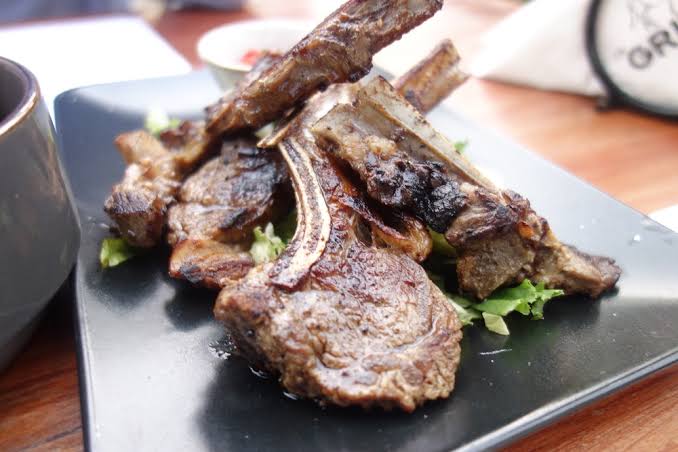Lamb meat is a type of red meat that comes from young sheep, typically less than one year old. It is a popular meat in many cultures and cuisines, known for its tender texture and distinctive flavor.
In Nigeria, lamb meat is used for suya, as well as other dishes. It also cooked on a spit and served in dishes like shawarma or kebab.
Over the years, lamb meat hasn’t been given much priority. Most people still confuse it for beef, but the tasty flavor of the lamb’s meat always proves them wrong. In addition to being highly tasty, lamb’ meat contains a dense amount of high-quality proteins, minerals, and vitamins, which makes it an excellent meat choice.
Well today, you find out the nutritional value and some of the fantastic health benefits of lamb meat.
Nutritional Value Of Lamb Meat
Lamb meat is a rich source of protein, providing 25 grams per 100 grams serving. It is also a good source of iron and cobalamin, contributing 10% and 43% of the daily value respectively.
It also contains cholesterol, sodium, magnesium, potassium, vitamins B12 and B6.
However, it is high in fat, with 21 grams per serving, including 9 grams of saturated fat. Lamb meat is low in carbohydrates and sugar, but does not provide significant amounts of vitamins C or D.
5 Health Benefits Of Lamb Meat

Here are the health benefits of lamb meat:
1. Good source of Iron
Lamb meat is a good source of iron. It contains heme iron, which is a highly bioavailable form of iron. Also, it enhances the body to absorb non-heme iron (the type of iron found in plants).
The rich iron content of lamb meat helps the body to produce more red blood cells and recover blood faster after bleeding or donation. Also, this help increases the oxygen capacity of your blood.
Additionally, it prevents anemia, a condition caused by low levels of red blood cells characterized by weakness and fatigue.
2. High-quality protein source
Lamb meat is rich in all nine amino acids – the complete protein that helps to maintain muscle mass in older adults. Also, it promotes the proper growth of body cells and muscles in children or teens. This makes it suitable for both the young and old.
Inadequate protein intake may worsen age-related muscle problems, such as sarcopenia, a condition characterized by very low muscle mass.
3. Rich in beta-alanine
Lamb meat is rich in the amino acid beta-alanine, which is used to produce carnosine in the body. Carnosine is a substance that improves muscle function.
A high level of carnosine is linked to improved physical exercise performance and decreased fatigue. This makes it a perfect choice for athletes and fitness enthusiasts to optimize their performance.

4. Contains healthy fats
Healthy fat is an essential part of the human diet. Lamb meat is rich in two fatty acids in lamb, which are highly beneficial to the body. They are as follows:
- Omega-3: Lambs raised on pasture contain almost the exact level of anti-inflammatory omega-3 fatty acids as fish.
- Oleic acid: Lamb meat is rich in Oleic acid, which is a monounsaturated fatty acid that is linked to lower levels of inflammation
Lamb fat, also known as tallow, has more saturated fat than beef and pork, and contains ruminant trans fats, such as conjugated linoleic acid (CLA).
However, unlike artificial trans fats, ruminant trans fats are considered healthy, and lamb has the highest amount of CLA compared to other meats.
CLA has been linked to health benefits such as lower body fat, but excessive intake from supplements may have negative effects on metabolism.
5. A nutrient-dense meat
Compared to most meat, lamb is incredibly nutrient-dense meat. Here are some reasons it is regarded as nutrient-dense meat.
- Rich in vitamins and minerals, specifically B vitamins and zinc.
- Rich in complete and highly digestible protein.
- Rich in large amounts of healthy fat than most land animals.
- Rich in beneficial compounds, such as conjugated linoleic acid, carnosine, creatine, glutathione, and taurine.
The above nutrients are contained in good amounts, making it a very healthy diet.
Does Eating Lamb Meat Have Any Risk
Lamb meat is categorized as red meat. There have been debates on the linkage between the consumption of red meat and the increased risk of cardiovascular diseases. To be on the safe side, consume lamb meta in moderation, especially if you are older than 30 years.
Never eat lamb meat in its raw state, and ensure it passes the heat before consuming it.
Conclusion
Lamb meat is very healthy and provides complete protein, vitamin B, zinc, healthy fats, and acid beta-alanine in large quantities. The health benefits of lamb meat are fantastic indeed. Nonetheless, make sure you practice moderation as you consume or include lamb meat as part of your diet.
YOU SHOULD ALSO READ:
- Is Red Meat Good For The Body?
- 5 Impressive Health Benefits of Liver Meat
- 7 Amazing Health Benefits Of Kpomo
- 6 Superb Health Benefits of Snail Meat
- 6 Notable Health Benefits of Rabbit Meat
- 7 Amazing Health Benefits Of Red Meat
- 5 Health Benefits of Roasting Food
- Health Benefits and Side Effects of Bushmeat
- 5 Awesome Health Benefits Of Pork Meat
- 5 Surprising Health Benefits Of Squirrel Meat
- 5 Amazing Health Benefits of intestine meat
- 7 Amazing Health Benefits of Eating Goat Meat
- 7 Spectacular Health Benefits Of Kilishi
- 5 Amazing Health Benefits Of Catfish
Collins Nwokolo is a human physiologist, writer and health enthusiast. He loves writing helpful articles on health and fitness, which he enjoys sharing with everyone.









